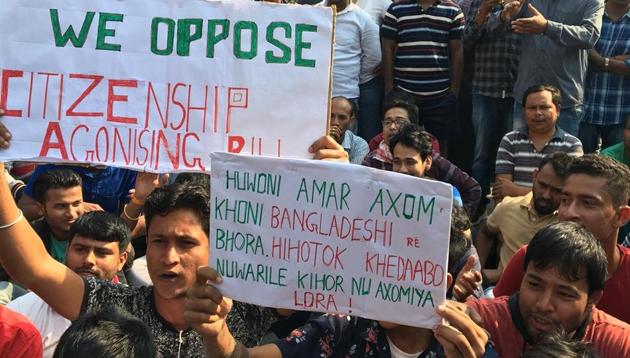
As the BJP-led central government gets ready to table the Citizenship (Amendment) Bill in the Rajya Sabha or Upper House of Parliament on Wednesday, the Northeast has erupted in protest.

The legislation will fast-track citizenship claims from persecuted minorities from Muslim-majority Pakistan, Bangladesh and Afghanistan. People in the Northeast fear that large numbers of Hindu migrants from Bangladesh, who they say are intruders, will swamp their homeland.
So, the protesters clashed with police, set fire to tyres and cut down trees to block roads on Tuesday in a shutdown across the region hours after the bill was approved by the Lower House of Parliament or Lok Sabha. In Tripura, there is an 11-hour bandh called by the North East Students’ Organisation (NESO).
Also Watch | Explained | Citizenship Amendment Bill: The content, the controversy
The Tripura government has suspended mobile internet and SMS services in the state for 48 hours to prevent spread of rumours and to maintain law and order situation in the state. The prohibition has been extended to press messages as well, according to the government order.
On Tuesday, the Northeast was crippled by a strike call given by different organisations, with buses off the roads and most schools and shops shut. In Assam’s Kamrup district, authorities imposed an order restricting gatherings of two or more people amid fears the violence could escalate.
The Lok Sabha passed the bill just after midnight on Monday amid fierce debate in the House which saw AIMIM leader Asaduddin Owaisi tearing a copy of the bill. Once law, it will make it much easier for Hindus, Sikhs, Buddhists, Jains, Parsis, and Christians fleeing Afghanistan, Bangladesh and Pakistan to become Indians.
The central government says Muslims from these three countries are excluded because they can choose to go to other Muslim countries. Also excluded are other minorities fleeing political or religious persecution elsewhere, such as Tamils from Sri Lanka, Rohingya from Myanmar and Tibetans from China.
Many in India feared that the government aims to conduct a nationwide National Register of Citizens (NRC) to identify and expel all “infiltrators” by 2024. But in Parliament, Home Minister Amit Shah sought to dispel the notion by saying, “I say this again and again that this bill has nothing to do with the Muslims in this country.”
On Monday, almost 1,200 scientists and scholars at institutions in India and abroad published a joint letter expressing their “dismay” at the legislation, saying the constitution called for members of all faiths to be treated equally.
The US Commission on International Religious Freedom in a statement Monday termed the bill as a “dangerous turn in the wrong direction”, that together with the proposed National Register of Citizens, aims to create a religious test for Indian citizenship that would strip citizenship from millions of Muslims.
India’s foreign ministry retorted on Tuesday saying the US group’s remarks were “neither accurate nor warranted” and “guided by their prejudices and biases”.
The BJP is confident that it will get enough support from parties in the Rajya Sabha. It is banking on the support of All India Anna Dravida Munnetra Kazhagam (AIADMK), the YSR Congress Party (YSRCP), the Telugu Desam Party (TDP) and the Biju Janata Dal (BJD) - all of which are outside the fold of the National Democratic Allliance (NDA). Its former ally Shiv Sena, which had supported the bill in the Lok Sabha, set the stage for a u-turn on Tuesday when its chief Uddhav Thackeray said it will not support the bill in the Upper House unless the party addresses the questions raised by it.
This, however, has not dampened the BJP’s spirit. “The Shiv Sena’s statement will not affect the passage of the bill. we are confident of the numbers,” a senior BJP functionary and a member of the Rajya Sabha said.
The party also brushed aside divisions within Nitish Kumar’s Janata Dal (United) [JD(U)] over the issue of supporting the bill and said, it is counting on getting 127 votes in the Rajya Sabha.